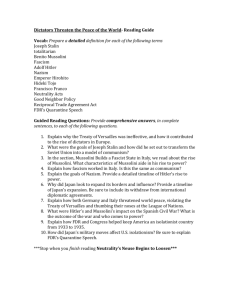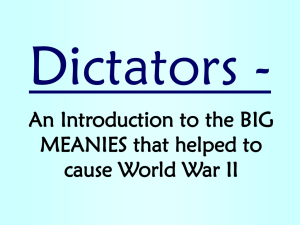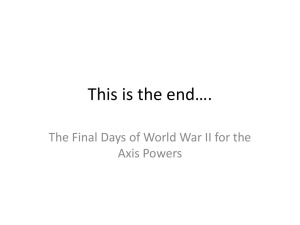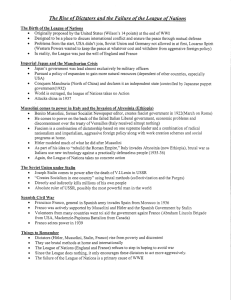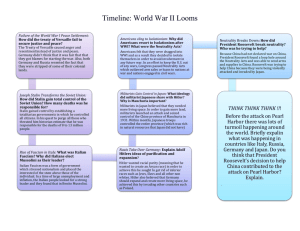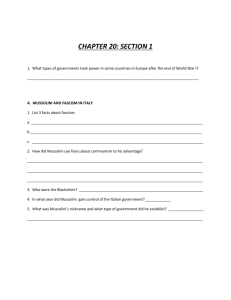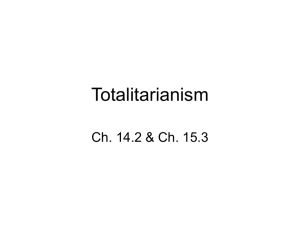24.1 Lecture Notes
advertisement
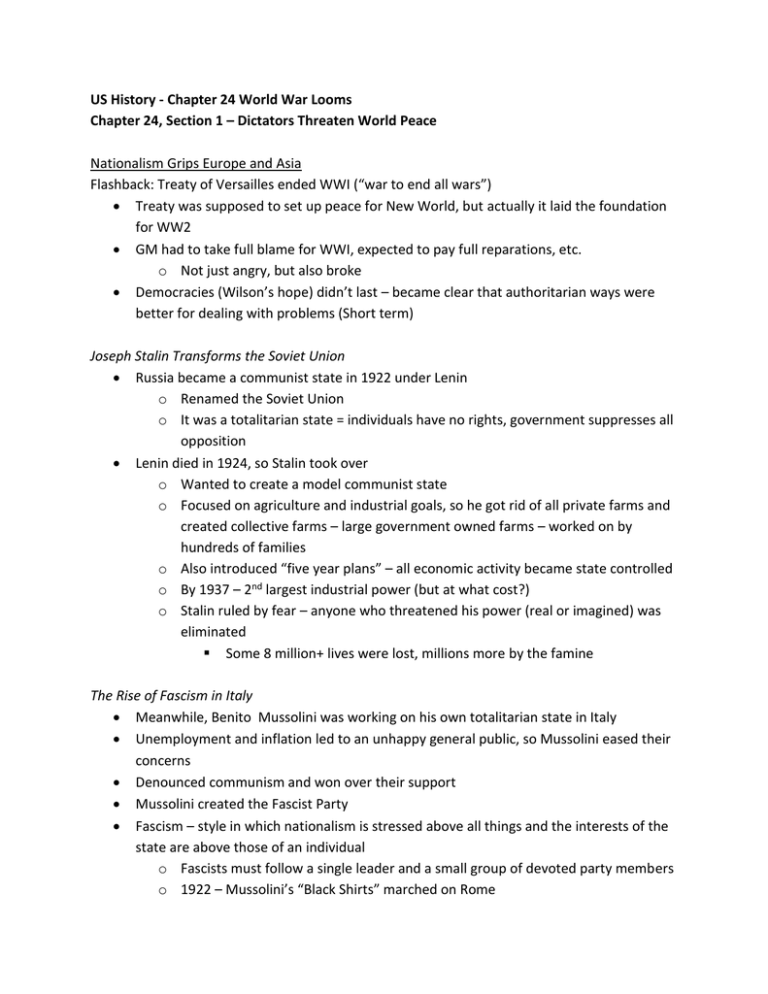
US History - Chapter 24 World War Looms Chapter 24, Section 1 – Dictators Threaten World Peace Nationalism Grips Europe and Asia Flashback: Treaty of Versailles ended WWI (“war to end all wars”) Treaty was supposed to set up peace for New World, but actually it laid the foundation for WW2 GM had to take full blame for WWI, expected to pay full reparations, etc. o Not just angry, but also broke Democracies (Wilson’s hope) didn’t last – became clear that authoritarian ways were better for dealing with problems (Short term) Joseph Stalin Transforms the Soviet Union Russia became a communist state in 1922 under Lenin o Renamed the Soviet Union o It was a totalitarian state = individuals have no rights, government suppresses all opposition Lenin died in 1924, so Stalin took over o Wanted to create a model communist state o Focused on agriculture and industrial goals, so he got rid of all private farms and created collective farms – large government owned farms – worked on by hundreds of families o Also introduced “five year plans” – all economic activity became state controlled o By 1937 – 2nd largest industrial power (but at what cost?) o Stalin ruled by fear – anyone who threatened his power (real or imagined) was eliminated Some 8 million+ lives were lost, millions more by the famine The Rise of Fascism in Italy Meanwhile, Benito Mussolini was working on his own totalitarian state in Italy Unemployment and inflation led to an unhappy general public, so Mussolini eased their concerns Denounced communism and won over their support Mussolini created the Fascist Party Fascism – style in which nationalism is stressed above all things and the interests of the state are above those of an individual o Fascists must follow a single leader and a small group of devoted party members o 1922 – Mussolini’s “Black Shirts” marched on Rome The Italian king realized everyone supported Mussolini, so he appointed Mussolini as head of the government Eventually, Mussolini had extended Fascism to every aspect of their lives (crushed all opposition) The Nazis Take Over Germany 1919 – Adolf Hitler joined the Nazi Party Nazi Party – National Socialist German Workers’ Party o Actually not tied to socialism though o Because of Hitler’s speaking abilities, he became Nazi Party’s leader Nazism – Based on extreme nationalism (German version of Fascism) o Hitler’s dream: Unite all German speaking people into a great German Empire Also wanted racial “purification” Aryans were the “master race” destined to rule the world in his opinion (blue eyes, blonde hair) Also wanted National Expansion – Hitler felt GM needed more “living space” (lebensraum) – outlined this in his famous book, Meinkampf Great Depression actually helped Nazis rise to power o Germans were so broke, unemployed, desperate, etc., that they would try anything including this new guy and his “Brown Shirts” – the private army of Hitler’s By 1932, Nazis were strongest political party in GM 1933 – Hitler was appointed chancellor of GM (or Prime Minister) o Upon taking over, the democratic republic was dissolved o Replaced it with “Third Reich” – 3rd GM Empire that would last for 1,000 years Militarists Gain Control in Japan Meanwhile, nationalistic leaders were also trying to take over imperial JP o Nationalistic leaders agreed with Hitler in lebensraum o These militant nationalists surprise attacked Manchuria (part of China) and all of its rich resources The League of Nations had been established to deal with things just like this o Representatives were sent to investigate the Manchurian invasion o Result: Condemned JP for wrongdoing o JP’s response: They quit the League o JP’s government was in control by these militarists Aggression in Europe and Africa Europe’s dictators (Hitler, Stalin, Mussolini) noticed the League of Nations’ weak response to JP o 1933 – Hitler took GM out of League and built up GM’s military (violation of the Treaty of Versailles) o Then sent troops into the Rhineland (GM region by FR that had been demilitarized) o League did nothing about it Mussolini began building his Roman Empire, starting with Ethiopia Fall 1935 – thousands of Italian soldiers ready to advance on Ethiopia o League of Nations responded this time, but their “tough talk” led to an ineffective economic boycott (not good!) May 1936 – Ethiopia fell o Haile Selassie (Ethiopian emperor) – “It is us today. It will be you tomorrow.” Civil War Breaks Out in Spain 1936 – Francisco Franco led a group of Spanish army officers against the Spanish Republic (Fascists) o Result: Spanish Civil War o Throughout the world, people chose sides o “Abraham Lincoln Battalion” – 3,000 US soldiers fought against Franco Ultimately, fascism spread to Spain o Western democracies remained neutral o Hitler and Mussolini backed Franco’s forces with troops, weapons, tanks, etc. Close relationships forged between GM & IT Led to Rome-Berlin Axis – alliance So totalitarian regimes in: Italy, Germany, Spain, & Russia The United States Responds Cautiously While alarming, most Americans remained isolationists Kellogg-Briand Pact had been signed back in 1928, stating war would not be used for policy issues o But there was no plan for what to do if countries broke their pledge, and did use war Americans Cling to Isolationism Early 1930s – books were written and newspapers discussed how US had gotten into WWI because of greedy bankers and arms manufacturers Public outrage led to formal investigation o Committee showed large profits by banks and manufacturers o Americans were upset and became even more “anti-war” o Girl Scouts even changed color from khaki to green FDR had sensed his country’s desires and did a number of things to keep “good feelings” amongst the nations: o Recognized the newly formed SU o Continued Good Neighbor Policy in Latin America Congress also passed a series of Neutrality Acts o Acts outlawed arms sales or loans to nations at war o Also extended the bans to nations in civil wars (SP) Neutrality Breaks Down Despite all these attempts to guarantee neutrality, FDR knew it wasn’t possible FDR found a way around the Neutrality Acts with regards to the JP/CH fiasco, and continued to support CH by sending arms and supplies FDR’s Quarantine speech didn’t set well (Chicago – 1937) o But his speech would begin to resonate
